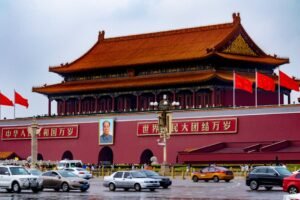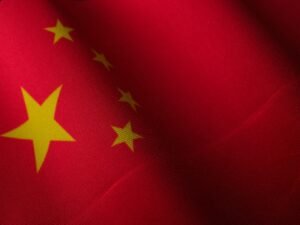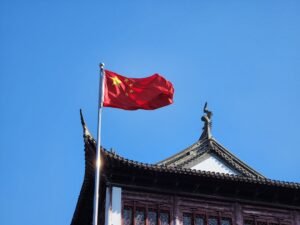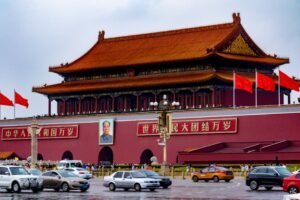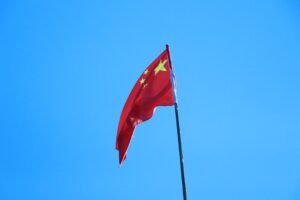The Mid-Autumn Festival (中秋节 Zhōngqiū Jié), also commonly referred to as the Moon Festival, is a traditional Chinese holiday that celebrates the full moon on the 15th day of the eighth lunar month. Rooted in age-old customs, it’s a time for family reunions, moongazing, and savoring the symbolic mooncake. If you’re interested in Chinese culture and want to celebrate the Mid-Autumn Festival with a touch of language learning, read on!
Table of Contents
ToggleUnderstanding the Origins
Before delving into the language aspect, understanding the festival’s history can be enriching. The celebration has its roots in ancient myths like the stories of Chang’e, the moon goddess, and Hou Yi, the legendary archer.
- 月亮 (Yuèliàng): Moon
- 神话 (Shénhuà): Myth
- 嫦娥 (Cháng’é): Chang’e, the moon goddess
- 后羿 (Hòu Yì): Hou Yi, the archer
Relishing Mooncakes
Mooncakes (月饼 Yùebǐng) are the signature dish of the festival. These pastries contain various ingredients like red beans, lotus seed paste, and sometimes even salted egg yolks.
- 我想吃月饼。 (Wǒ xiǎng chī yuèbǐng.): I want to eat a mooncake.
- 这个月饼很好吃。 (Zhège yuèbǐng hěn hǎochī.): This mooncake is very delicious.
Gazing at the Full Moon
Gathering under the bright full moon and appreciating its beauty is a cherished activity. It’s also a time for reflection and thoughts about loved ones who are far away.
- 今晚的月亮很亮。 (Jīnwǎn de yuèliàng hěn liàng.): The moon is very bright tonight.
- 我想念我的家人。 (Wǒ xiǎngniàn wǒ de jiārén.): I miss my family.
Lighting Lanterns
In some regions, lighting lanterns and releasing them into the sky or on water is part of the celebration.
- 灯笼 (Dēnglóng): Lantern
- 放灯笼 (Fàng dēnglóng): Release lanterns
Expressing Festival Greetings
Express your best wishes to friends and family.
- 中秋节快乐! (Zhōngqiū Jié kuàilè!)Happy Mid-Autumn Festival!
- 团团圆圆 (Tuántuán yuányuán): A phrase that symbolizes reunion and completeness.
Wrapping Up
Immersion in Chinese culture can be greatly enhanced by attending the Mid-Autumn Festival. You experience the festival more genuinely and significantly and gain a deeper understanding of its essence by including language instruction.
Frequently Asked Questions (FAQs)
When exactly is the Mid-Autumn Festival celebrated?
The festival is celebrated on the 15th day of the eighth lunar month, typically in the Gregorian calendar in late September or early October.
Is the Mid-Autumn Festival only celebrated in China?
While it originates in China, the festival is also celebrated in other East and Southeast Asian countries, including Vietnam, Malaysia, Singapore, and Korea, albeit with regional variations.
What is the significance of the moon during this festival?
The moon is a symbol of unity and completeness. The festival’s focus on the full moon represents family reunion and togetherness.
Are there vegetarian or vegan mooncakes?
Yes, many varieties of mooncakes are vegetarian, and vegan mooncakes are also available that omit ingredients like egg yolks and dairy.
Can I find celebrations in Western countries?
Yes! Many cities worldwide with significant Chinese communities, such as San Francisco, London, and Sydney, host Mid-Autumn Festival events. Check local event listings or Chinese cultural organizations.
Why are lanterns released during the festival?
Lanterns symbolize brightness and hope. Releasing them is a way to express worries and wishes for a prosperous future.
How can I further incorporate Chinese language learning into my celebration?
Consider watching movies or reading stories about the festival, joining language exchange meet-ups focused on the event, or attending a local celebration and practicing your Mandarin with native speakers.
What other foods are typically enjoyed during the Mid-Autumn Festival apart from mooncakes?
Fruits like pomelos and grapes are also popular, as are dishes like duck and crab in certain regions.
How long has the Mid-Autumn Festival been celebrated?
The festival has ancient origins and has been celebrated for over a thousand years, with its roots in moon worship and agricultural celebrations.



